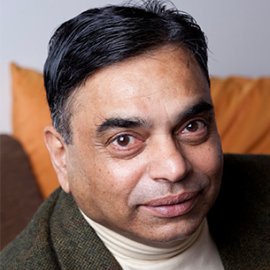Former Ambassador of India, Director of the Academy of International Studies, Jamia Millia Islamia University, New Delhi, India

Février to Mars 2013
Over a 36-year long career with the Indian Foreign Service, T.C.A. Rangachari served in a variety of posts across different continents.
Starting his career in Hong Kong, he moved to Beijing in the mid-seventies during the Cultural Revolution.
Thereafter, he was at India’s Permanent Mission to the United Nations in New York, working on several UN committees, including human rights and on NGOs, and represented India on the Governing Boards of the UNDP, UNFPA and UNICEF.
He was India’s Ambassador to Algeria, Germany and France. Earlier, he spent over five years in Islamabad, Pakistan, as Deputy High Commissioner.
He served in various capacities in the Ministries of External Affairs and Finance of the Government of India in New Delhi, including the East Asia division, UN division, External Publicity Division and as Chief Passport Officer of the Government of India.
Mr. Rangachari holds an MA degree, in History from Hindu College, Delhi University.
He speaks English, Hindi, Tamil, Chinese and French. He is a member of the Executive Committee of the Institute for Defence Studies and Analysis, New Delhi. He has served as an external expert with the Department of East Asian Studies in Jawaharlal Nehru University, New Delhi. He is one of the Founding Directors of Fight Hunger Foundation in India (an NGO affiliated with Action Contre la Faim en France). Presently, he is the Director of the Academy of International Studies, Jamia Millia Islamia University, New Delhi.
"The Rise of China and the International System"
China is, today, the second largest economy in the world after the US. Estimates suggest that it will overtake the US in the next two decades. Having achieved considerable success in its drive, initiated in 1978, to modernize agriculture, industry and S&T, China is now turning to the fourth modernization - of military power. Indeed, the Chinese defense budget now exceeds that of Japan and India combined. China sees a growing military as a symbol of its peaceful rise and as a strategic requirement of a big power called upon to defend its interests to the best of its ability.
Historically, the economically and militarily powerful have set the agenda, rules and standards regionally and globally. In consequence, what is the direction in which a rising China will seek to re-fashion the region and the world? What would be the value system on which an economically and militarily powerful China will base its regional and global leadership role on? Would they be the same values on which the post-War international order has sought to be based e.g. rule of law, individual freedoms and human rights? Would the political system be representative such as in a participatory democracy? Would the economic system be market-oriented rather than state controlled? Would the society be liberal? In international relations, would dialogue and other peaceful means, or the threat, or the use, of coercive force, be the preferred instrumentality to resolve differences and disputes?
These are issues which have the potential to profoundly affect – for good or otherwise – the international order. Its outcome has particular relevance for India for whom China is the largest neighbor.